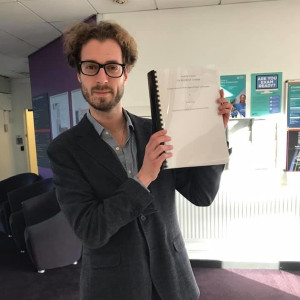Samuel Beckett's "Waiting for Godot" is a play that explores the theme of communication through its characters, their interactions, and the play's overall structure. The play presents the audience with two tramps, Vladimir and Estragon, who are waiting for a mysterious figure called Godot, whom they believe will bring meaning to their existence. As they wait, the two tramps engage in a series of conversations that reveal the complexities of human communication.
One of the main themes of communication in "Waiting for Godot" is the difficulty of establishing meaningful communication. Throughout the play, Vladimir and Estragon struggle to communicate with each other, often talking past each other or misunderstanding what the other is saying. Their conversations are often circular, and they frequently repeat themselves, suggesting that their communication is not leading anywhere.
The theme of communication is also explored through the play's structure. "Waiting for Godot" is a play that is built around the idea of waiting, and the audience is presented with a series of repetitive, seemingly meaningless events that occur while Vladimir and Estragon wait for Godot. This repetition creates a sense of monotony, and the play's lack of plot or clear resolution can leave the audience feeling frustrated or confused. This structure reflects the characters' inability to communicate effectively and their sense of being trapped in a meaningless existence.
The play also explores the theme of communication through its use of language. The dialogue in "Waiting for Godot" is often fragmented, disjointed, and filled with non-sequiturs, which can make it difficult for the audience to follow. The characters' speech patterns are also significant, with Vladimir often using more complex language than Estragon. This discrepancy suggests a power dynamic between the two characters, with Vladimir being the more dominant and educated of the two.
Additionally, the theme of communication is explored through the play's use of silence. The moments of silence in "Waiting for Godot" are often more significant than the dialogue. For example, the long pauses in between the characters' conversations can be read as a reflection of their inability to communicate effectively. The silence can also be seen as a metaphor for the lack of meaning in their lives.
In conclusion, "Waiting for Godot" is a play that explores the theme of communication through its characters, structure, language, and use of silence. The play presents the audience with characters who struggle to communicate effectively and are trapped in a meaningless existence. Through its exploration of this theme, "Waiting for Godot" offers a critique of human communication and highlights the difficulty of establishing meaningful connections with others.

Waiting for Godot Summary
Near a tree, two men named Vladimir and Estragon engage in conversation while waiting for a man named Godot. As they converse, they touch on various topics and gradually reveal the purpose of their wait. Suddenly, two more men enter the scene. One of them, Pozzo, is on his way to the market to sell his slave, Lucky. Pozzo briefly pauses to chat with Vladimir and Estragon, and Lucky keeps them entertained with his dancing and philosophical musings before Pozzo and Lucky depart.
After Pozzo and Lucky leave, a boy appears and identifies himself as a messenger from Godot. He informs Vladimir that Godot will not be arriving that night but promises that he will come the next day. Vladimir asks the messenger some questions about Godot, and the boy then leaves. Following his departure, Vladimir and Estragon contemplate leaving as well, but they do not move from their spot as the curtain falls.
On the following night, Vladimir and Estragon reconvene near the tree, hoping to finally meet Godot. To their surprise, Lucky and Pozzo return, but Pozzo is now blind and Lucky is mute. Pozzo has no recollection of their previous encounter with the two men. After a brief exchange, Pozzo and Lucky depart, and Vladimir and Estragon are once again left to wait in uncertainty.
Soon after, the boy reappears and informs Vladimir once again that Godot will not be arriving. Despite Vladimir's attempt to clarify their previous conversation, the boy denies ever speaking to him before. After the boy departs, Vladimir and Estragon contemplate leaving once more but ultimately remain rooted in place as the curtain falls, bringing the play to a close.
The theme of Communication in Waiting for Godot
The theme of communication is a pervasive and prominent aspect of Samuel Beckett's play "Waiting for Godot." Throughout the play, the characters' communication (or lack thereof) serves as a significant source of tension and confusion.
Vladimir and Estragon's conversations are often fragmented and nonsensical, with the characters struggling to understand each other's meaning. They frequently misunderstand or misinterpret each other's words, leading to frustration and further miscommunication.
The arrival of Pozzo and Lucky complicates matters further, as their exchanges with Vladimir and Estragon are equally disjointed and confused. Pozzo, in particular, talks in a rambling and incomprehensible manner, while Lucky's muteness creates a language barrier that further complicates communication.
The recurring appearance of the boy who brings messages from Godot further highlights the theme of communication. His messages are often contradictory, and he denies having spoken to Vladimir before, indicating a lack of clarity and reliability in communication.
Overall, the theme of communication in "Waiting for Godot" underscores the inherent difficulties of human interaction, particularly in a world fraught with confusion and ambiguity.
Attachment
An Essay on Theme of Communication in the Play Waiting for Godot












Thank you, this really helped my child! He is now in Reading Boys!!!
😃